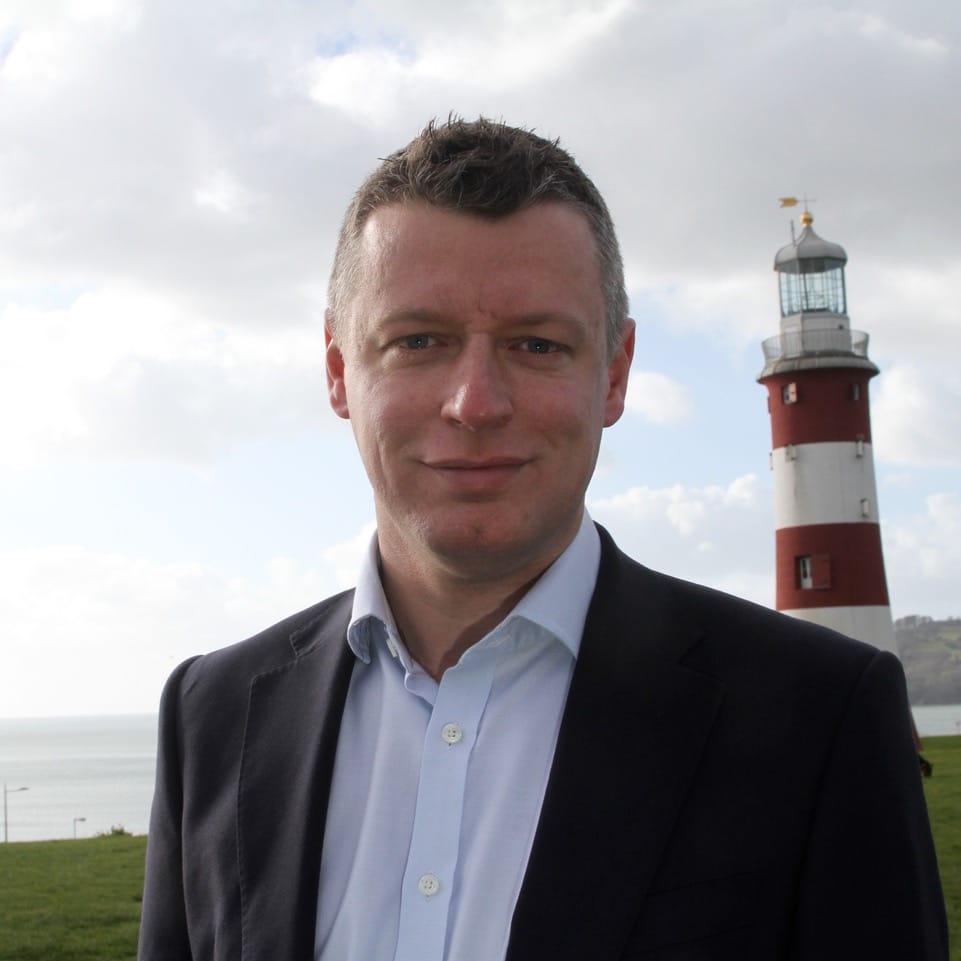News
Interview: Luke Pollard, MP for Plymouth, talks to Jeff Goodman about the proposed first UK National Marine Park

To date, I have always thought so-called marine protected areas in the UK to be a sham. Poorly regulated and enforced. Could this finally be a change of times? I was delighted to learn about the proposal for creating the UK’s first National Marine Park in my home counties of Devon and Cornwall. I caught the news recently and heard that initial funding has been awarded. Wonderful!
About Luke Pollard
Luke Pollard was elected as the Labour and Co-operative Member of Parliament for Plymouth Sutton and Devonport in June 2017. Luke was born and lives in Plymouth and is the first MP to be born in Plymouth since Michael Foot represented the city in 1945.
After winning the seat from the Conservatives, Luke was appointed PPS to Shadow Environment Secretary, Sue Hayman MP, before being promoted to Shadow Environment Minister responsible for Water, Flooding, Fishing and Coastal Communities in July this year.
In December 2018 at the University of Plymouth, Luke launched proposals to create the UK’s First National Marine Park (NMP) in Plymouth Sound.
Plymouth Sound is one of the most unique marine environments in the UK. It includes the Plymouth Sound and Tamar Estuaries Marine Protected Area designated for its abundance and diversity of wildlife, the largest naval base in western Europe, a nationally significant fish market, over 13,000 people in Plymouth are employed in the marine sector, it is home to world-class marine research and boasts a rich maritime history. Nowhere in the UK is more deserving of special recognition. Developing a National Marine Park (NMP) here in Plymouth will not only provide a huge local benefit but it will provide a model, which campaigners intend to roll out across coastal communities on a national scale. You can read more about this here.
Jeff: Thanks for taking time out to tell us more about the proposal for the UK’s first National Marine Park and I would like to heartily congratulate you and all the other people and groups involved in devising and moving this project forward.
How, when and why did you first become involved with the project?
Luke: It was just after Theresa May called the snap election in 2017 that I decided to make campaigning for the UK’s National Marine Park to be one of my key campaign pledges. Labour was 27 points behind in the polls and I thought: I have nothing to lose and so I might as well be bold and go for policies that will really make a difference. A marine park turned out to be one of the most popular pledges I made in 2017 and helped me get elected. Now, as an MP, I’m working with Plymouth City Council and our city’s academics including Professor Martin Attrill, who first proposed the concept, many years ago.
Jeff: Can you tell us the key aspects of the proposed park and how it would function?
Luke: The basic premise behind the National Marine Park is that people don’t know anything about marine protection. Plymouth Sound already has SSSIs, MCZs and a dozen other protected statuses, but it would be very hard to find anyone in Plymouth who could name more than one, if that. The idea behind a National Marine Park is that it takes a concept we all know, understand and value of a National Park, and applies it to the marine environment. Suddenly, you have public understanding of marine protection in a way that all the MCZs in the world don’t achieve. It is a gateway for understanding marine protections and helping people value the marine environment more.
Jeff: In my opinion, official marine parks in the UK are long over due and have always met fierce opposition especially from the fishing industry. What are the circumstances and conditions that have made this possible now?
Luke: The basic principle of a National Marine Park is that we must have sustainable environmental protections and sustainable economic activity. The drive to create a National marine park comes at the same time as there’s a real focus on fishing. Our local fleet has the potential to be more sustainable and more successful and that is why good dialogue between Government, councils and industry is needed to deliver improved sustainability locally.
Jeff: Will both commercial and recreational fishing in the park be regulated and enforced?
Luke: We are exploring with stakeholders about how a National Marine Park should work. There isn’t another UK marine park for us to follow so it is a bit of test and try. What we do know is that there are some very successful efforts by fishers and scientists to protect and repopulate different parts of our marine environment, minimise impact of fishing gear and value fishing more. It’s a work in progress here but we need a sustainable industry both environmentally and economically after all you can’t fish what isn’t there any more because of over-fishing.
Jeff: In a previous statement you mention the shock of seeing the BBC Blue Planet revelation of the state of our oceans. Have you always been concerned about the negative things we are doing to our planet or is this newly found?
Luke: As a young lad growing up in Devon, I remember swimming in the sea past floating turds and sanitary towels. That was because Britain used to flush our sewers right out to sea. It took billions of pounds and a national effort to achieve the clean and safe bathing waters around the south west coast. We need a similar national effort to deal with plastic pollution at home and abroad. Blue Planet II was a wake up call we must not ignore.
Jeff: Are you ever able to get out at sea and watch the incredible wildlife we have around our shores?
Luke: Very occasionally on the water via a kayak or stand up paddle board, but more likely from the coast paths around Plymouth.
Jeff: I cannot imagine the day when I won’t be able to get to the coast and be on the water. Do you snorkel or dive and been able to see first hand marine life in and around the shores of the UK?
Luke: I get so seasick which is rubbish for an MP who speaks so often about the importance of the Royal Navy, our fishing industry, marine science and our coastal waters. I do enjoy a bit of snorkelling and I’m a wild swimmer. There really is nothing better to relieve the stresses of Westminster than a swim in Plymouth Sound bobbing along with the waves on a sunny day and looking over the Hoe and foreshore. We are so lucky to have this on our doorstep and I want more people to take the plunge and explore our coast line whether on the coast path or by getting wet.
Jeff: Who do you think will be the main beneficiaries from the park?
Luke: We know that middle class folks tend to get the maximum returns from National Parks mainly because they can afford their own transport. I want to see the biggest benefits of a National Marine Park being those who come from our poorest communities. You only need to see the kids paddling in the sea on a sunny day in Plymouth to see how many are not wearing swimming costumes but underwear. Plymouth is one of the poorest cities in the country and being flanked by gorgeous countryside and beautiful beaches doesn’t change the economic challenges. But the sea is free and creating marine citizenship for every child so they understand and can engage with rock pools, waves and sandy beaches is vital. Some recent research found that in Plymouth – a city that prides itself on being Britain’s Ocean City – some 20% of kids have not even seen the sea. That needs to change. We have turned our back on the sea for far too long as a city and as a country and that needs to change.
Jeff: What will be the final budget needed to set the park up and keep it running and where will that money come from?
Luke: We have been successful in winning financial support from the Marine Management Organisation for some early work on the National Marine Park project. Final costs must match our ambition and that is being worked on now. I don’t want to see new levies or taxes to pay for the marine park. I think it needs to be an investment made by the city and our local businesses in its promotion and engagement. The National Marine Aquarium in Plymouth along with Plymouth Marine Laboratories and the Marine Biological Association have all committed effort to date and their enthusiasm and passion for the project is a real inspiration. The proposals have caught the imagination of marine scientists, engineers and local businesses as a way of telling the untold stories of our coast and coastal communities. I’m really excited about where this project is going and what it could achieve. The early stages are now underway but there is an awful lot of detail that still needs to be worked out ahead.
Jeff: Would the park create openings for park wardens and how would the park be enforced?
Luke: Plymouth Sound is already one of the most protected bits of water in the whole country. That’s protected by a range of government agencies and of course as Devonport is Western Europe’s largest Naval base, we have plenty of people with guns keeping an eye on our waters too! I think the concept of a national marine park needs to refresh enforcement and the best way to protect a bit of water is to have people value it and the diversity under the surface. The full details are being worked out but I really want to have the marine park tell the story of the people who work day in, day out protecting it already but the idea of park wardens as champions, educationalists and story tellers is something that has been proposed. We do need to protect our coastal waters and that means having the right people involved from Government and those conversations are starting to happen. It will take time but I think this is time well spent.
Jeff: I hope this will be a milestone in the future protection and longevity of our UK waters and wildlife. Will you personally take an interest in seeing this rolled out to the rest of the UK?
Luke: I want Plymouth Sound to be the UK’s first National Marine Park. That means we need to have a second, third, fourth, fifth in the pipeline. Britain’s coastline is incredible, with such beautiful diversity. I am certain there won’t be a shortage of candidates once the concept has been developed and rolled out in Plymouth.
Jeff: Is there anything now that we the general public can do to help this park become a reality?
Luke: Plymouth City Council who I passed the baton over to are consulting with local people and stakeholders and there’ll be events and consultations aplenty to contribute to in due course, but we don’t need to wait until a marine park is designated to make the most of our coastal waters today. So, visit a beach, go on a litter pick, reduce your plastic, learn to kayak or sail, walk on a beach or explore a coast path. At the moment, the biggest way people can get involved is to connect with the marine environment and share their stories.
Jeff: Thanks for taking the time to talk with me. Please do keep us informed if you can as the project moves forward and I hope you get time to get out and enjoy our wonderful marine wildlife.
Gear News
Scubapro Free Octopus Promotion 2024
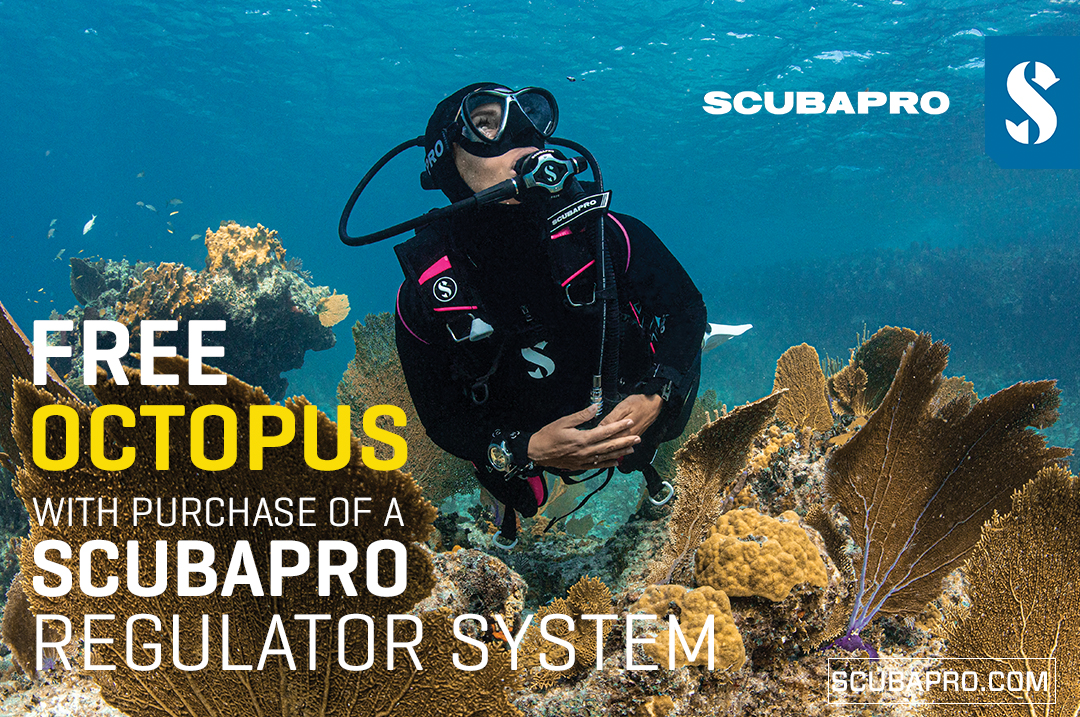
Free Octopus with every purchase of a SCUBAPRO regulator system
Just in time for the spring season, divers can save money with the FREE OCTOPUS SPRING PROMOTION! Until July 31st SCUBAPRO offers an Octopus for free
with every purchase of a regulator system!
Get a free S270 OCTOPUS with purchase of these combinations:
MK25 EVO or MK19 EVO with A700
MK25 EVO or MK19 EVO with S620Ti
MK25 EVO or MK19 EVO with D420
MK25 EVO Din mit S620Ti-X
Get a free R105 OCTOPUS with purchase of the following combinations:
MK25 EVO or MK19 EVO with G260
MK25 EVO or MK17 EVO with S600
SCUBAPRO offers a 30-year first owner warranty on all regulators, with a revision period of two years or 100 dives. All SCUBAPRO regulators are of course certified according to the new European test standard EN250-2014.
Available at participating SCUBAPRO dealers. Promotion may not be available in all regions. Find an authorized SCUBAPRO Dealer at scubapro.com.
More information available on www.scubapro.com.
Blogs
Northern Red Sea Reefs and Wrecks Trip Report, Part 3: The Mighty Thistlegorm
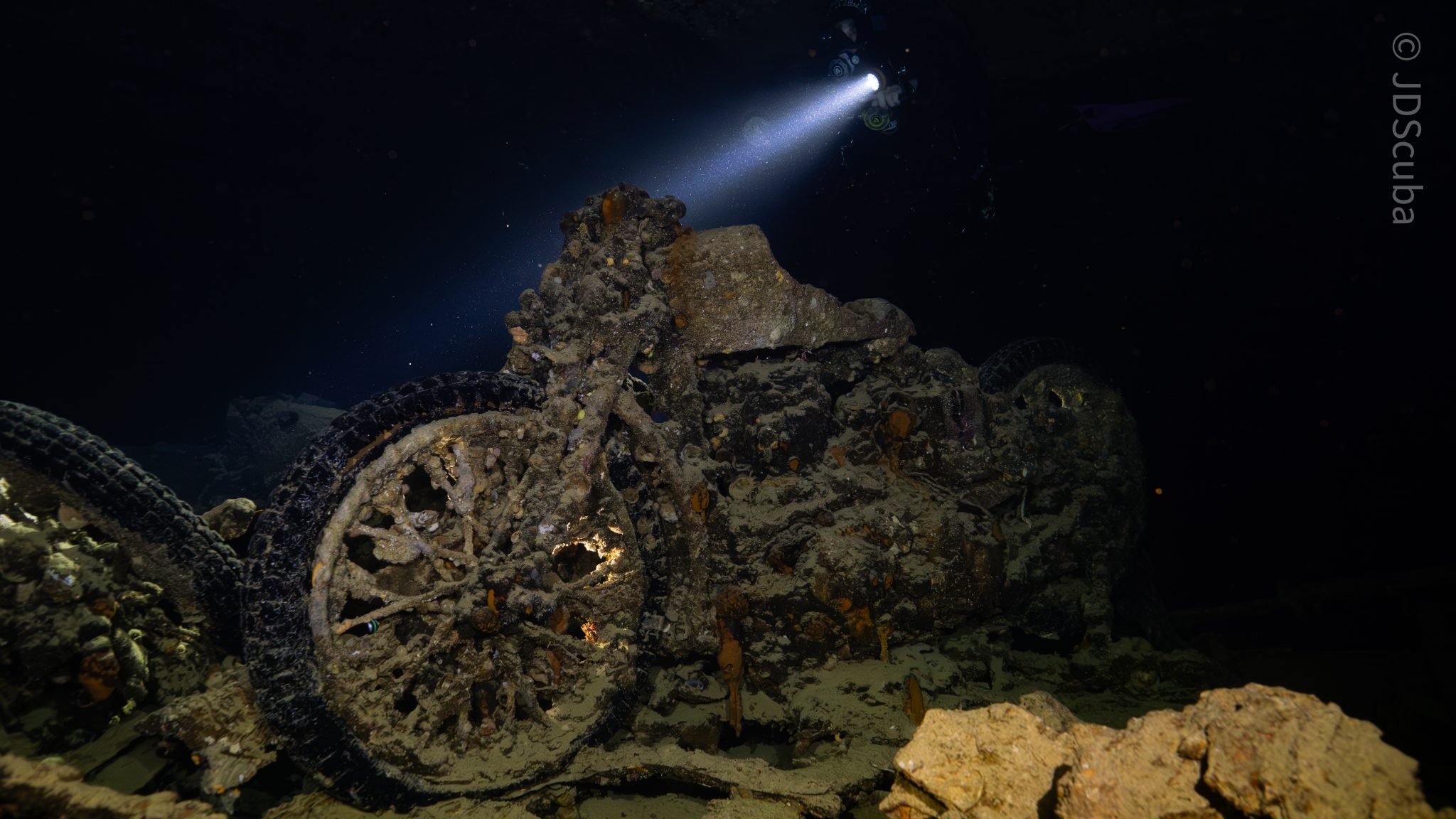
Jake Davies boards Ghazala Explorer for an unforgettable Red Sea diving experience…
Overnight, the wind picked up, making the planned morning dive a bit bumpy on the Zodiacs to the drop point on Thomas Reef. There, we would dive along the reef before descending through the canyon and then passing under the arch before ascending the wall with a gentle drift. The site provided great encounters with more pelagic species, including shoals of large barracuda, tuna, and bigeye trevally.
Once back on the boat, it was time to get everything tied down again as we would head back south. This time, with the wind behind us, heading to Ras Mohammed to dive Jackfish Alley for another great gentle drift wall dive before then heading up the coast towards the Gulf of Suez to moor up at the wreck of the Thistlegorm. This being the highlight wreck dive of the trip and for many onboard, including myself, it was the first time diving this iconic wreck. I had heard so much about the wreck from friends, and globally, this is a must on any diver’s list. Fortunately for us, there was only one other boat at the site, which was a rarity. A great briefing was delivered by Ahmed, who provided a detailed background about the wreck’s history along with all the required safety information as the currents and visibility at the site can be variable.
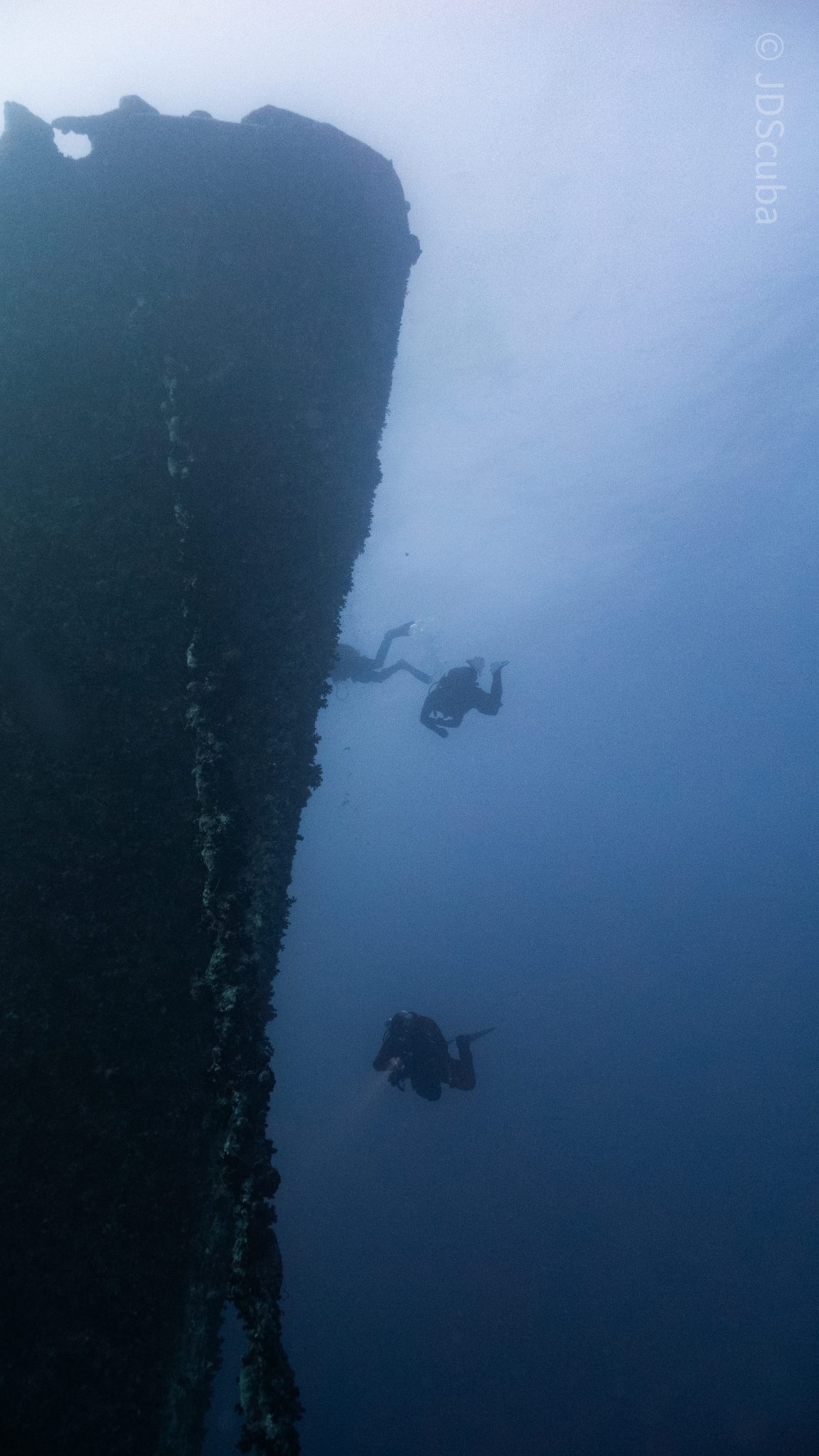
Kitting up, there was a lot of excitement on deck before entering the water and heading down the shoreline. Descending to the wreck, there was a light northerly current which reduced the visibility, making it feel more like the conditions that can be found off the Welsh coast. At 10m from the bottom, the outline of the wreck appeared as we reached the area of the wreck which had been bombed, as our mooring line was attached to part of the propeller shaft. Arriving on deck, instantly everywhere you looked there were many of the supplies which the ship was carrying, including Bren Carrier tanks and projectiles that instantly stood out.
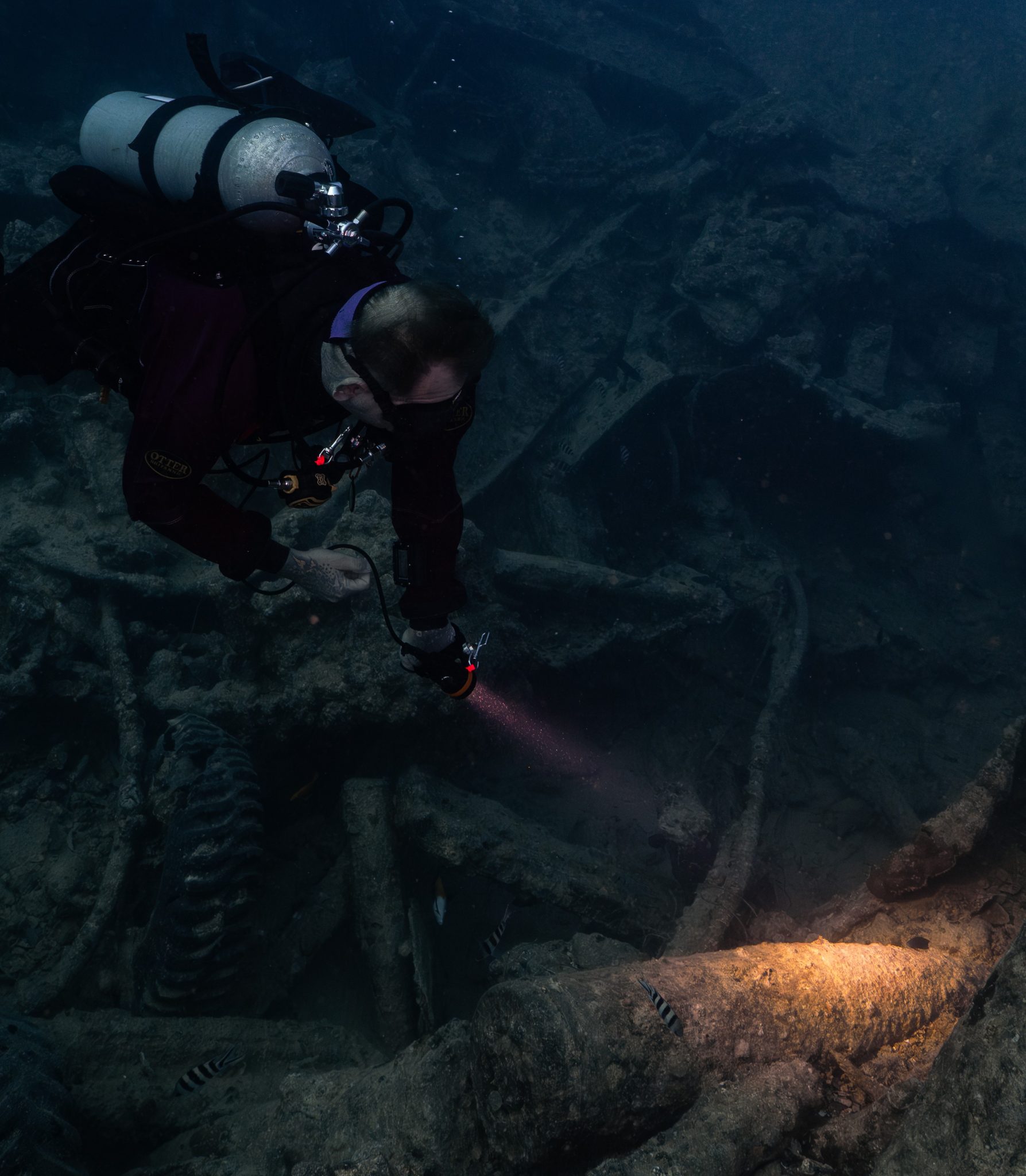
We headed around the exterior, taking a look at the large propeller and guns mounted on deck before entering the wreck on the port side to take a look in the holds. It was incredible to see all the trucks, Norton 16H, and BSA motorcycles still perfectly stacked within, providing a real snapshot in time.
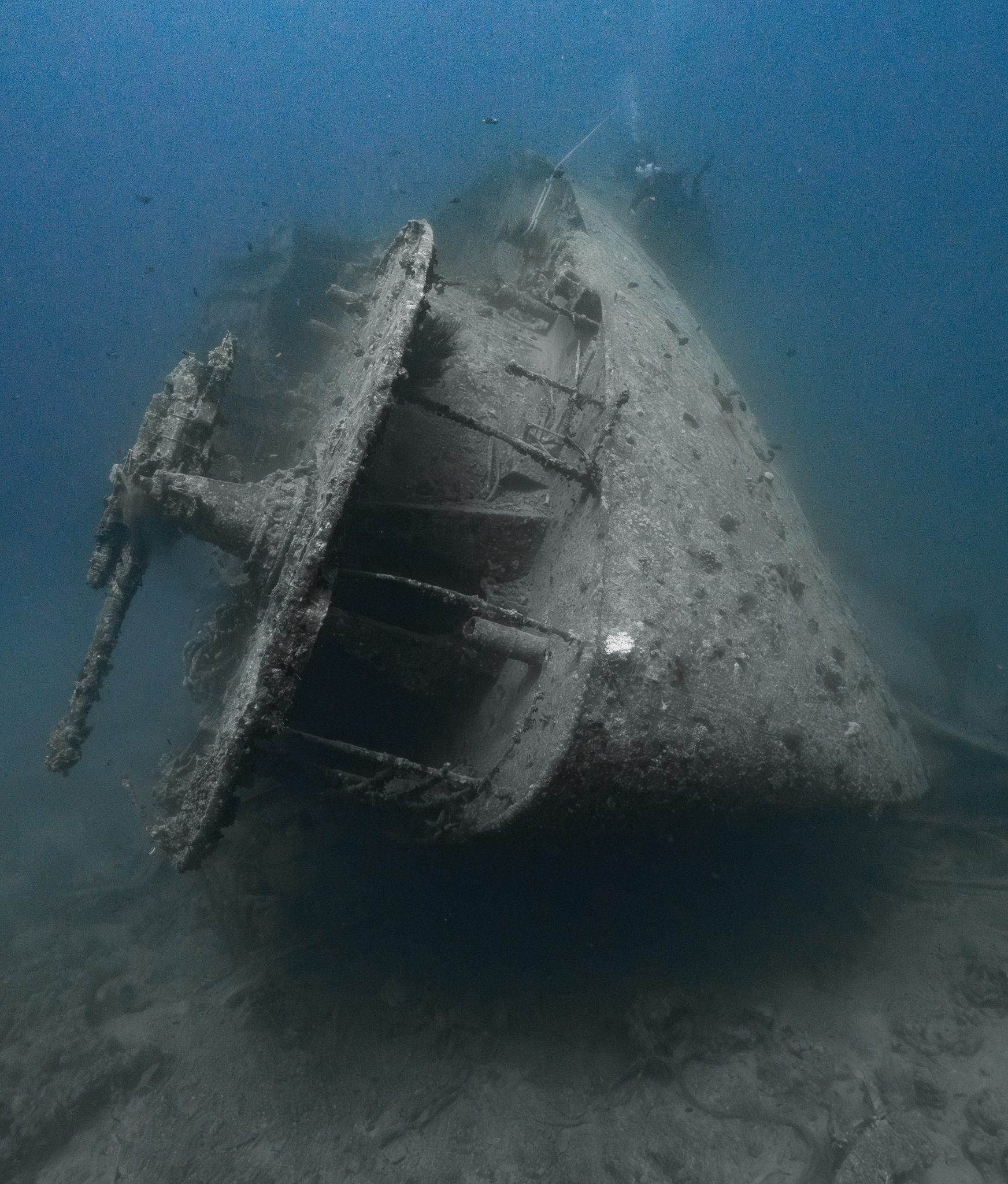
Overall, we had four dives on the Thistlegorm, where for all of the dives we were the only group in the water, and at times, there were just three of us on the whole wreck, which made it even more special, especially knowing that most days the wreck has hundreds of divers. Along with the history of the wreck, there was plenty of marine life on the wreck and around, from big green turtles to batfish, along with shoals of mackerel being hunted by trevally. Some unforgettable dives.
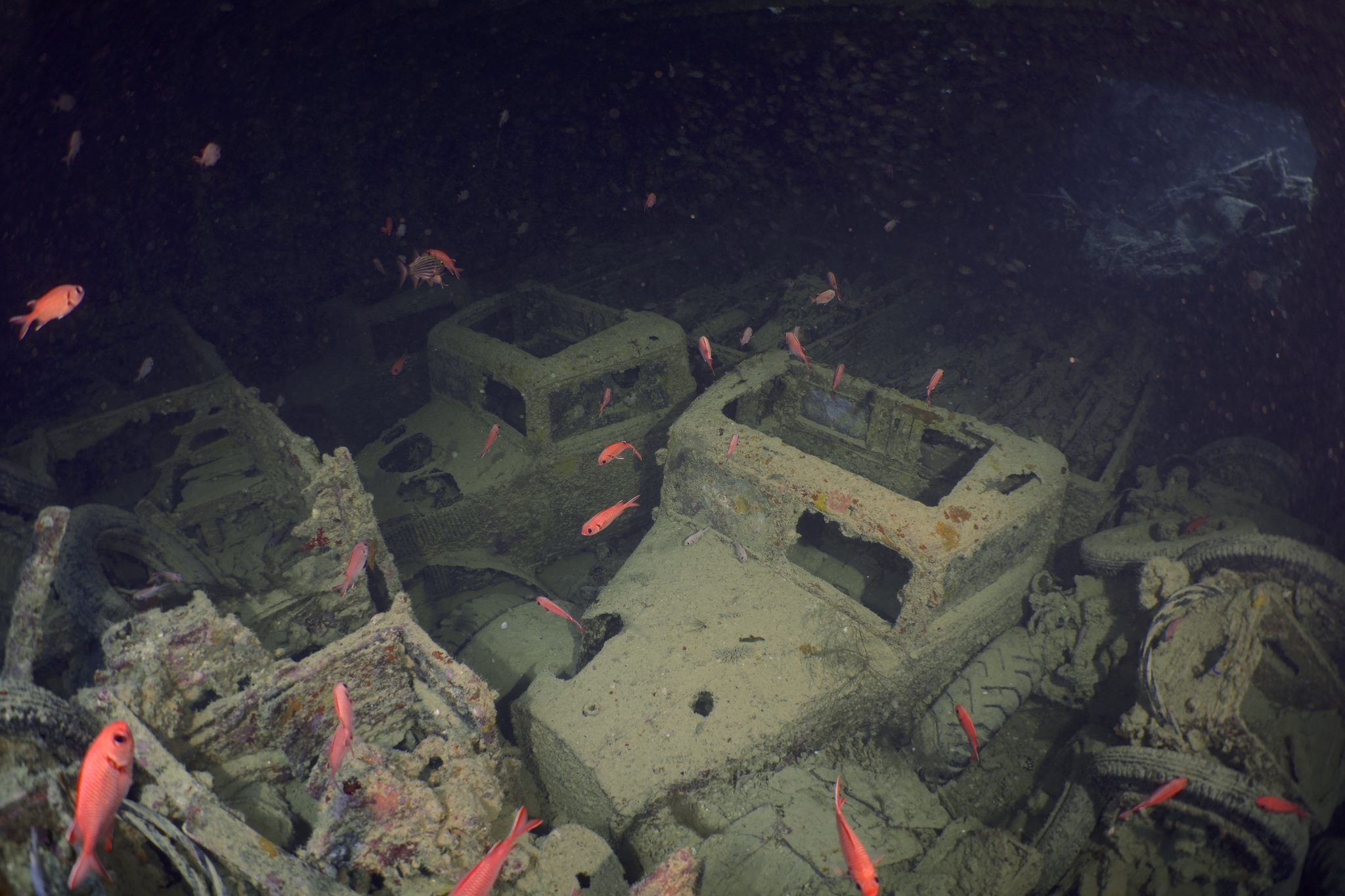
The final leg of the trip saw us cross back over the Suez Canal to the Gobal Islands where we planned to stay the night and do three dives at the Dolphin House for the potential of sharing the dive with dolphins. The site, which included a channel that was teeming with reef fish, especially large numbers of goatfish that swam in large shoals along the edge of the reef. These were nice relaxing dives to end the week. Unfortunately, the dolphins didn’t show up, which was okay as like all marine life they are difficult to predict and you can’t guarantee what’s going to be seen. With the last dive complete, we headed back to port for the final night where it was time to clean all the kit and pack before the departure flight the next day.
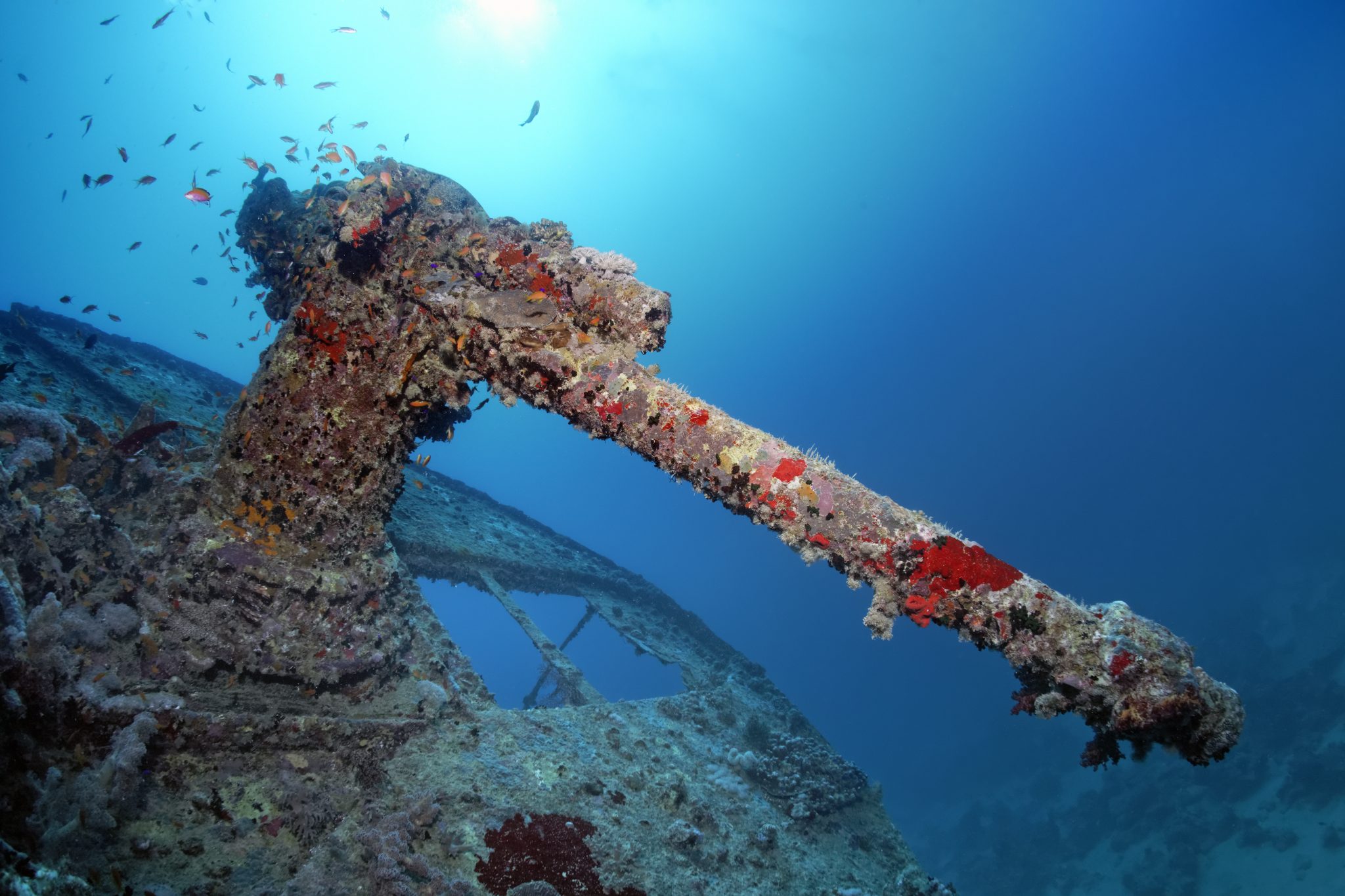
The whole week from start to finish on Ghazala Explorer was amazing; the boat had all the facilities you need for a comfortable week aboard. The crew were always there to help throughout the day and the chefs providing top quality food which was required after every dive. The itinerary providing some of the best diving with a nice mixture of wreck and reef dives. I would recommend the trip to anyone, whether it’s your first Red Sea liveaboard in the Red Sea or you’re revisiting. Hopefully, it’s not too long before I head back to explore more of the Red Sea onboard Ghazala Explorer.
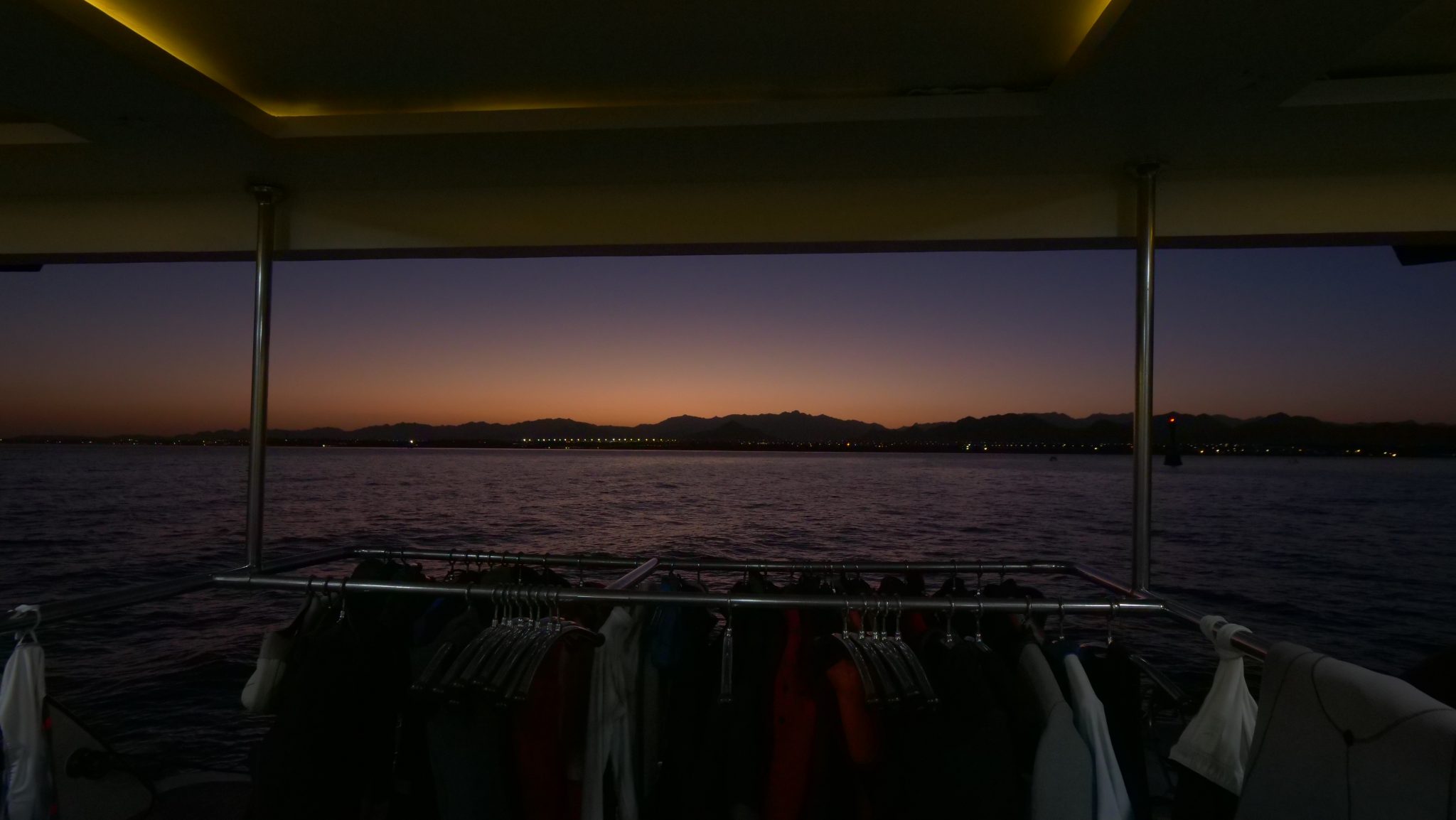
To find out more about the Northern Red Sea reef and wrecks itineraries aboard Ghazala Explorer, or to book, contact Scuba Travel now:
Email: dive@scubatravel.com
Tel: +44 (0)1483 411590
Photos: Jake Davies / Avalon.Red
-

 News3 months ago
News3 months agoHone your underwater photography skills with Alphamarine Photography at Red Sea Diving Safari in March
-

 News3 months ago
News3 months agoCapturing Critters in Lembeh Underwater Photography Workshop 2024: Event Roundup
-

 Marine Life & Conservation Blogs2 months ago
Marine Life & Conservation Blogs2 months agoCreature Feature: Swell Sharks
-

 Blogs2 months ago
Blogs2 months agoMurex Resorts: Passport to Paradise!
-

 Blogs2 months ago
Blogs2 months agoDiver Discovering Whale Skeletons Beneath Ice Judged World’s Best Underwater Photograph
-

 Marine Life & Conservation2 months ago
Marine Life & Conservation2 months agoSave the Manatee Club launches brand new webcams at Silver Springs State Park, Florida
-

 Gear Reviews3 months ago
Gear Reviews3 months agoGear Review: Oceanic+ Dive Housing for iPhone
-

 Gear Reviews2 weeks ago
Gear Reviews2 weeks agoGEAR REVIEW – Revolutionising Diving Comfort: The Sharkskin T2 Chillproof Suit


